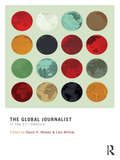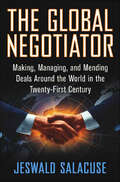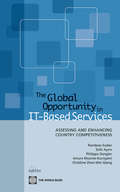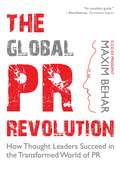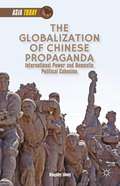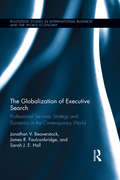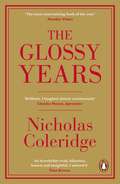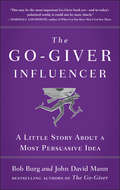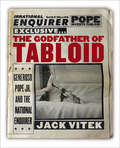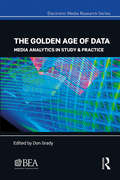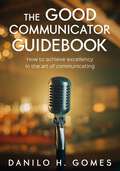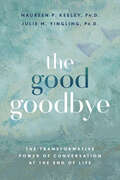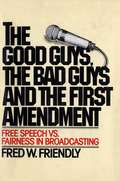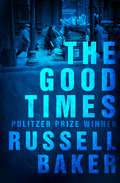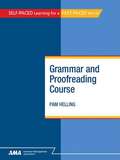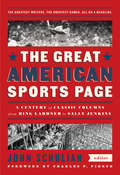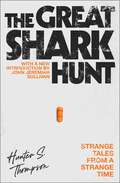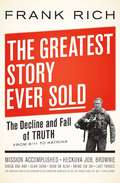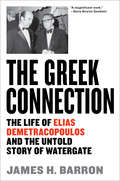- Table View
- List View
The Global Journalist in the 21st Century (Routledge Communication Ser.)
by Lars Willnat David H. WeaverThe Global Journalist in the 21st Century systematically assesses the demographics, education, socialization, professional attitudes and working conditions of journalists in various countries around the world. This book updates the original Global Journalist (1998) volume with new data, adding more than a dozen countries, and provides material on comparative research about journalists that will be useful to those interested in doing their own studies. The editors put together this collection working under the assumption that journalists’ backgrounds, working conditions and ideas are related to what is reported (and how it is covered) in the various news media round the world, in spite of societal and organizational constraints, and that this news coverage matters in terms of world public opinion and policies. Outstanding features include: Coverage of 33 nations located around the globe, based on recent surveys conducted among representative samples of local journalists Comprehensive analyses by well-known media scholars from each country A section on comparative studies of journalists An appendix with a collection of survey questions used in various nations to question journalists As the most comprehensive and reliable source on journalists around the world, The Global Journalist will serve as the primary source for evaluating the state of journalism. As such, it promises to become a standard reference among journalism, media, and communication students and researchers around the world.
The Global Negotiator: Making, Managing, and Mending Deals Around the World in the Twenty-First Century
by Jeswald SalacuseIn today's global business environment, an executive must have the skills and knowledge to navigate all stages of an international deal, from negotiations to managing the deal after it is signed. The aim of The Global Negotiator is to equip business executives with that exact knowledge. Whereas most books on negotiation end when the deal is made, Jeswald W. Salacuse will guide the reader from the first handshake with a potential foreign partner to the intricacies of making the international joint venture succeed and prosper, or should things go poorly, how to deal with getting out of a deal gone wrong. Salacuse illustrates the many ways in which an international deal may falter and the methods parties can use to save it, provides the necessary technical knowledge to structure specific business transactions, and explores the transformations to the international business landscape over the last decade.
The Global Opportunity in IT-Based Services
by Christine Zhen-Wei Qiang Randeep Sudan Arturo Muente-Kunigami Philippe Dongier Seth AyersRapid advances in information technology (IT) and the resulting global connectivity are fueling dynamic growth in the services sector. Demand for IT and IT-enabled services (ITES) is estimated to represent a $500 billion annual market, of which only about 20 percent has been realized. Thus, this sector is creating new opportunities for economic growth, social empowerment, and grassroots innovation in developing countries. The potential for employment for youth and women is a particular benefit. This book is a practical guide for policy makers aiming to grow their IT services and ITES industries. It defines the development impact of the two industries and then analyzes factors crucial to the competitiveness of a country or location-including skills, cost advantages, infrastructure, and a hospitable business environment. It examines the potential competitiveness of small countries and of least developed countries specifically. This volume presents the Location Readiness Index, a modeling tool developed by McKinsey and Company for the World Bank and the Information Development Program. The index helps countries to identify their areas of relative strengths and weaknesses and to focus their efforts on interventions with the greatest likelihood for success. The book concludes by discussing specific policy options for enabling growth in the IT services and ITES industries.
The Global PR Revolution: How Thought Leaders Succeed in the Transformed World of PR
by Maxim Behar“An excellent guide.” —Paul Holmes, The Holmes ReportPR is everything and everywhere. Now more than ever, managing social media is a nuanced and dynamic field that requires the sophisticated touch of a trained professional. What was effective ten or even five years ago is no longer relevant. In The Global PR Revolution, public relations expert Maxim Behar shows readers how to master current approaches, create content that meets a client’s needs, and evolve with ever-changing trends. Complete with insights from over seventy PR leaders worldwide, this authoritative guide discusses such topics as: The New Rules of Social MediaHow to Speak the Language of PRModern PR Skills and ToolsHow to Measure ImpactThe Effect of Total Transparency on BusinessesInternational Perspectives on the MediaThe Future of the Industry Behar’s knowledge, experience, and down-to-earth writing will keep readers engrossed while refining their understanding of public relations. By the time they finish, they’ll be well on their way to becoming experts in the field.
The Global Public Relations Handbook: Theory, Research, and Practice
by Dejan Vercic Krishnamurthy SrirameshIn this third edition, The Global Public Relations Handbook: Theory, Research, and Practice offers state-of-the-art discussions of the global public relations industry, blending research-based theory with practice, and presented in essays from both academics and practitioners. This edition's 28 essays in three sections take into account changes in the global communication landscape especially in the last ten years. The first section contains essays that provide conceptual linkages between public relations and international political systems, economic systems and levels of development, societal culture, different media systems including digital media, and activism. Essays in the second section discuss the communication of various global actors such as corporations (including family-owned enterprises), non-profits, governments (and public sector enterprises), global public relations agencies, IGOs such as the European Union and NATO and "informal" organizations such as hactivist groups, terrorists, and failed states. The third section discusses key global communication issues such as climate change, character assassination as a communication tool, internal communication, risk and crisis communication, public affairs, and public diplomacy. This will be an essential resource for students and researchers of public relations, strategic communication, and international communication.
The Globalization of Chinese Propaganda
by Kingsley EdneyThis book investigates the relationship between the Chinese Communist Party's crucial goal of using the propaganda system to consolidate its power within the domestic political environment and its prominent recent attempts to use propaganda overseas to increase China's international power.
The Globalization of Executive Search: Professional Services Strategy and Dynamics in the Contemporary World (Routledge Studies in International Business and the World Economy)
by Jonathan V. Beaverstock James R. Faulconbridge Sarah J.E. HallExecutive search, headhunting, is now one of the archetypal new knowledge intensive professional services, as well as a labor market intermediary bound up with globalization. In this book, the authors examine the key actors in the process of executive search globalization – leading global firms – and offer an interpretation of the forces producing the contemporary organizational strategies of global executive search. The Globalization of Executive Search documents the forms of institutional work that have legitimated the role of executive in elite labor markets and created demand for the services of global firms; this exposes not only the changing geographies of executive search, but also how executive search has established itself as a new knowledge intensive professional service. The authors reveal how the globalization of executive search is exemplary of the processes by which a range of new knowledge intensive professional services have come to be globally recognized, approaching the heart of contemporary capitalism.
The Globalization of Strangeness
by Chris RumfordThe figure of the stranger is in serious need of revision, as is our understanding of the society against which the stranger is projected. Under conditions of globalization, inside/outside markers have been eroded and conventional indicators of 'we-ness' are no longer reliable. We now live in a generalized state of strangeness, one consequence of globalization: we no longer know where our community ends and another one begins. In such circumstances it is often the case that neighbours are the nearest strangers. Strangeness occurs when global consciousness outstrips global connectivity and this means that we need to rethink some core elements of globalization theory. Under conditions of strangeness the stranger is a 'here today, gone tomorrow' figure. This book identifies the cosmopolitan stranger as the most significant contemporary figure of the stranger, one adept at negotiating the 'confined spaces' of globalization in order to promote new forms of social solidarity and connect with distant others.
The Glossy Years: Magazines, Museums and Selective Memoirs
by Nicholas Coleridge'The most entertaining book of the year' Sunday Times _____________________________________________________Diana touched your elbow, your arm, covered your hand with hers. It was alluring. And she was disarmingly confiding."Can I ask you something? Nicholas, please be frank..."Over his thirty-year career at Condé Nast, Nicholas Coleridge has witnessed it all. From the anxieties of the Princess of Wales to the blazing fury of Mohamed Al-Fayed, his story is also the story of the people who populate the glamorous world of glossy magazines. With relish and astonishing candour, he offers the inside scoop on Tina Brown and Anna Wintour, David Bowie and Philip Green, Kate Moss and Beyonce; on Margaret Thatcher's clothes legacy, and a surreal weekend away with Bob Geldof and William Hague. Cara Delevingne, media tycoons, Prime Ministers, Princes, Mayors and Maharajas - all cross his path.His career in magazines straddles the glossies throughout their glorious zenith - from the 1970s, 1980s and 1990s to the digital iterations of the 21st century. Having cut his teeth on Tatler, and as Editor-in-Chief of Harpers & Queen, he became the Mr Big of glossy publishing for three decades.Packed with surprising and often hilarious anecdotes, The Glossy Years also provides perceptive insight into the changing and treacherous worlds of fashion, journalism, museums and a whole sweep of British society. This is a rich, honest, witty and very personal memoir of a life splendidly lived.__________________________________________________________'An entertaining whirlwind' Evening Standard'Gentle, jolly . . . Blissfully funny' Sunday Telegraph'An irresistible read, hilarious, honest and insightful. I adored it' Tina Brown'Sparkling' Spectator'Forthright, witty and gossipy . . . a passion for glossy magazines shines through this effervescent memoir' Sunday Express
The Go-Giver Influencer: A Little Story About a Most Persuasive Idea
by Bob Burg John David MannFrom the bestselling authors of The Go-Giver, Go-Givers Sell More, and The Go-Giver Leader comes another compelling parable about the paradox of getting ahead by placing other people's interests first.The Go-Giver Influencer is a story about two young, ambitious businesspeople: Gillian Waters, the chief buyer for Smith & Banks, a midsized company that operates a national chain of pet accessory stores; and Jackson Hill, the founder of Angels Clothed in Fur, a small but growing manufacturer of all-natural pet foods. Each has something the other wants. To Jackson, Smith & Banks represents the possibility of reaching more animals with his products--if he can negotiate terms and conditions that will protect his company's integrity. To Gillian, Angels Clothed in Fur could give her company a distinctive, uniquely high-quality line that will help them stand out from their competitors--if Angels Clothed in Fur can be persuaded to give them an exclusive.At first, the negotiations are adversarial and frustrating. Then, coincidentally, Gillian and Jackson each encounter a mysterious yet kindly mentor. Over the next week, while neither one realizes the other is doing the same, both Gillian and Jackson learn the heart of both mentors' philosophies: The Five Secrets of Genuine Influence.The story ends in a way that surprises everyone--and with lessons we can all apply in our efforts to resolve conflicts and influence others.
The Godfather of Tabloid: Generoso Pope Jr. and the National Enquirer
by Jack Vitek“An original American story of a tough, embattled media player with uncanny gifts for giving the public what they want.” —Publishers WeeklyIn The Godfather of Tabloid, Jack Vitek explores the life and remarkable career of Generoso Pope Jr. and the founding of the most famous tabloid of all—the National Enquirer. Upon graduating from MIT, Pope worked briefly for the CIA until he purchased the New York Enquirer with dubious financial help from mob boss Frank Costello. Working tirelessly and cultivating a mix of American journalists (some of whom, surprisingly, were Pulitzer Prize winners) and buccaneering Brits from Fleet Street who would do anything to get a story, Pope changed the name, format, and content of the modest weekly newspaper until it resembled nothing America had ever seen before.Pope was a man of contradictions: he would fire someone for merely disagreeing with him in a meeting (once firing an editor in the middle of his birthday party), and yet he spent upwards of a million dollars a year to bring the world’s tallest Christmas tree to the Enquirer offices in Lantana, Florida, for the enjoyment of the local citizens. Driven, tyrannical, and ruthless in his pursuit of creating an empire, Pope changed the look and content of supermarket tabloid media, and the industry still bears his stamp. Grounded in interviews with many of Pope’s supporters, detractors, and associates, The Godfather of Tabloid is the first comprehensive biography of the man who created a genre and changed the world of publishing forever.“An engaging saga of one man’s obsessive devotion to creating an entertaining alternative universe.” —The Wall Street Journal
The Golden Age of Data: Media Analytics in Study & Practice (Electronic Media Research Series)
by Don GradyAudience and media analytics is more important now than ever, and this latest volume in the cutting-edge BEA Electronic Media Research Series collects some of the top scholars working with big data and analytics today. These chapters describe the development and help define media analytics as an academic discipline and professional practice. Understanding audiences is integral to creating and distributing media messages and the study of media analytics requires knowing a range of skills including research methods, the necessary tools available, familiarity with statistical procedures, and a mindset to provide insights and apply findings. This book summarizes the insights of analytics practitioners regarding the current state of legacy media analysis and social media analytics. Topics covered include the evolution of media technologies, the teaching of media measurement and analytics, the transition taking place in media research, and the use of media analytics to answer meaningful questions, drive content creation, and engage with audiences.
The Good Communicator Guidebook: How to achieve excellency in the art of communicating
by Danilo H. GomesA book that aims to instruct those who want to improve their communication techniques. The good communicator manual Do not know how to communicate well? Want to improve your ability to persuade and your verbal skills? Find what you need in this work. The human race is the only one of the other creatures present on planet Earth that is able to communicate through verbal language. Even though it is a skill present in humans, most of them have great difficulty in expressing themselves satisfactorily. The power of words is immeasurable, especially if used correctly. Speed, gestures, breathing, assembling sentences, everything counts when it comes to communication. A good communicator achieves high goals using only his or her language-related abilities. This book will help you evolve effectively in your verbal and non-verbal communication powers. By acquiring this work, you will have access to subjects such as: - Self analysis - Persuasion - How to use words correctly - Identification of common communication errors - Objectivity and effectiveness through speaking "How to Improve Vocabulary" - Communication in the relationship - Techniques to improve non-verbal communication - Communication in appearance And much more! Transform your way of communicating and achieve your goals more easily!
The Good Fight: Battle of Britain Propaganda and the Few
by Garry CampionPropaganda during the Battle of Britain contributed to high national morale and optimism, with 'The 'Few's' prowess and valour projected through Air Ministry communiqu#65533;s and daily claims 'scores'. The media was a willing partner in portraying their heroism, also later consolidated in wartime publications, films and historiography.
The Good Goodbye: The Transformative Power of Conversation at the End of Life
by Maureen P. Keeley Ph.D Julie M. Yingling Ph.DCommunication experts offer examples and expertise about end-of-life conversations to inspire, teach, and encourage the reader to have their own and to grow from them.Death is one thing we cannot control. We will all face the death of a loved one. And many, if not most, people in our culture will be hesitant and unprepared to say goodbye.The Good Goodbye is meant to help those who must say goodbye to a loved one who is dying. In it, readers will discover how culture affects final conversations, and that often the last interactions may not consist of words but gestures and expressions. They will find examples from real people interviewed over many years, with themes that include love, everyday talk, taking care of business, identity messages, spiritual messages, and healing difficult relationships.Readers will learn about the positive outcomes of final conversations, both from the advice of children and the detailed stories of adults who were changed profoundly in their attitudes and life paths. They will also see that many people have experienced communication with their loved one after that loved one has passed. Finally, readers will discover how others have overcome negativity to engage in the good goodbye, and how they can improve their own preparedness to have final conversations.Anyone who faces the death of a loved one—and that will be all of us—can gain from reading this book. We have found that hospice workers, nurses, caregivers, assisted-living personnel, spiritual advisors, and grief groups are especially interested. But anyone who is walking the path with someone close who is dying will seek this information and enjoy the inspiration.The main message: Be there. Listen. Love. Be grateful for the opportunity to grow.
The Good Guys, the Bad Guys and the First Amendment: Free Speech Vs. Fairness in Broadcasting
by Fred W. FriendlyUnlike newspapers, TV and radio broadcasting is subject to government regulation in the form of the FCC and the Fairness Doctrine, which requires stations "to devote a reasonable amount of broadcast time to the discussion of controversial issues" and "to do so farily, in order to afford reasonable opportunity for opposing viewpoints." In this provocative book, Fred W. Friendly, former president of CBS News examines the complex and critical arguments both for and against the Fairness Doctrine by analyzing the legal battles it has provoked.
The Good Times
by Russell BakerA &“superb [and] often hilarious&” memoir of a life in journalism, from the Pulitzer Prize–winning author of Growing Up (The New York Times Book Review). &“Baker here recalls his years at the Baltimore Sun, where, on &‘starvation wages,&’ he worked on the police beat, as a rewrite man, feature writer and White House correspondent. Sent to London in 1953 to report on the coronation, he spent the happiest year of his life there as an innocent abroad. Moving to the New York Times and becoming a &‘two-fisted drinker,&’ he covered the Senate and the national political campaigns of 1956 and 1960, and, just as he was becoming bored with routine reporting and the obligation to keep judgments out of his stories, was offered the opportunity to write his own op-ed page column, &‘The Observer.&’ With its lively stories about journalists, Washington politicians and topical scandals, the book will delight Baker&’s devotees—and significantly expand their already vast number.&” —Publishers Weekly &“Aspiring writers will chuckle over Baker&’s first, horrible day on police beat, his panicked interview with Evelyn Waugh, and his arrival at Queen Elizabeth&’s coronation in top hat, tails, and brown-bag lunch.&” —Library Journal &“A wonderful book.&” —Kirkus Reviews
The Government Manager's Guide to Contract Negotiation
by Legette McIntyreThe Government Manager's Guide to Contract Negotiation Federal managers often find themselves at the negotiating table, charged with reaching a solid, fair deal for their agency. Now, you can gain a competitive edge in even the most difficult negotiations with time-tested, effective tactics from a noted authority on federal negotiations. This guide will help you understand the negotiation process, plan for it, develop strategies and tactics, anticipate and counter the other side's strategies and tactics, and conclude and document the negotiation. Concise, accessible, and authoritative, this book offers a veritable arsenal of winning strategies that you and your team can use in your next negotiation.
The Government Manager's Guide to Plain Language
by Judith G. Myers PhDThe ability to write well correlates highly with the ability to think well—to analyze information, weigh alternatives, and make decisions. Government managers must make instructions and policies clear to employees, give effective presentations, and communicate effectively with the public. In addition, government managers must model clear, effective writing for their staffs. A comprehensive chapter on using social media effectively and appropriately is included.
The Grammar and Proofreading Course
by Pam HellingPositive, practical techniques for achieving a more professional writing style. Here are the “how to” keys of writing—from putting the first words on paper to the final polishing and proofreading. Readers will learn how to edit their writing for improved clarity, cut excess words, use transitional phrases, recognize and correct run-on sentences and overcome procrastination and impulsive writing. Readers will learn how to: • Identify the key components of any well-written business document • Cut excess words and phrases from your writing • Use transitional words and phrases • Avoid misplaced and dangling modifiers and split infinitives • Use commas, semicolons, colons, dashes, and parentheses • Use slash marks, ellipsis marks, quotation marks, italics, and brackets • Recognize and correct run-on sentences • Proofread your writing for clarity of meaning • Overcome the two common writing problems that waste time and money—procrastination and impulsive writing
The Great American Sports Page: A Library of America Special Publication
by Charles P. Pierce John SchulianA first-of-its-kind celebration of the newspaper scribes who made sportswriting a glorious popular art, and immortalized America's greatest games and athletesSpanning nearly a century, The Great American Sports Page presents essential columns from more than three dozen masters of the press-box craft. These unforgettable dispatches from World Series, Super Bowls, and title bouts for the ages were written on deadline with passion, spontaneity, humor, and a gift for the memorable phrase. Read avidly day in and day out by a sports-mad public, these columnists became journalistic celebrities in their home cities, their coverage trusted and savored, their opinions hotly debated. Some even helped change the games they wrote about. Gathered here in a groundbreaking anthology, their writings capture some of sport's most enduring moments and many of its all-time greats: Babe Ruth, Jackie Robinson, Muhammad Ali, and Michael Jordan among them. But the best American sportswriters also found ways to write powerfully about lesser-known athletes and to convey, often with heartbreaking honesty and insight, the less glamorous and more tragic facets of the games we love. In its survey of the finest American sportswriting from Ring Lardner to Thomas Boswell, from Red Smith and Jimmy Cannon to Bob Ryan and Michael Wilbon, The Great American Sports Page takes the measure of the human richness, complexity, and competitive spirit of sports and the athletes who continue to fascinate and inspire us.
The Great Market Debate in Soviet Economics: An Anthology
by David M Jones William MoskoffThe most agonizing and protracted of all the Soviet reform debates has been the debate over economic reform. This anthology of essays and roundtables from party, professional and literary journals surveys the key issues in the market debate.
The Great Shark Hunt: Strange Tales from a Strange Time
by Hunter S. ThompsonThe first volume in Hunter S. Thompson&’s bestselling Gonzo Papers offers brilliant commentary and outrageous humor, featuring a new introduction from award-winning author and editor John Jeremiah Sullivan.Originally published in 1979, the first volume of the bestselling &“Gonzo Papers&” is now back in print. The Great Shark Hunt is Dr. Hunter S. Thompson&’s largest and, arguably, most important work, covering Nixon to napalm, Las Vegas to Watergate, Carter to cocaine. These essays offer brilliant commentary and outrageous humor, in signature Thompson style. Ranging in date from the National Observer days to the era of Rolling Stone, The Great Shark Hunt offers myriad, highly charged entries, including the first Hunter S. Thompson piece to be dubbed &“gonzo&”—&“The Kentucky Derby Is Decadent and Depraved,&” which appeared in Scanlan's Monthly in 1970. From this essay, a new journalistic movement sprang which would change the shape of American letters. Thompson's razor-sharp insight and crystal clarity capture the crazy, hypocritical, degenerate, and redeeming aspects of the explosive and colorful &‘60s and &‘70s.
The Greatest Story Ever Sold: The Decline and Fall of Truth From 9/11 to Katrina
by Frank RichA step-by-step account of how skillfully the White House has built its house of cards, to consolidate its power at any cost.
The Greek Connection: The Life of Elias Demetracopoulos and the Untold Story of Watergate
by James H. Barron"This is a magnificent work, a triumphant combination of exhaustive research and fine narrative writing."—Doris Kearns Goodwin, author of Leadership: In Turbulent Times He was one of the most fascinating figures in 20th-century political history. Yet today, Elias Demetracopoulos is strangely overlooked--even though his life reads like an epic adventure story . . . As a precocious twelve-year-old in occupied Athens, he engaged in heroic resistance efforts against the Nazis, for which he was imprisoned and tortured. After his life was miraculously spared, he became an investigative journalist, covering Greece's tumultuous politics and America's increasing influence in the region. A clever and scoop-hungry reporter, Elias soon gained access to powerful figures in both governments . . . and attracted many enemies. When the Greek military dictatorship took power in 1967, he narrowly escaped to Washington DC, where he would lead the fight to restore democracy in his homeland--while running afoul of the American government, too. Now, after a decade of research and original reporting, James H. Barron uncovers the story of a man whose tireless pursuit of uncomfortable truths would put him at odds with not only his own government, but that of the Truman, Eisenhower, Kennedy, Johnson, Nixon, Ford, Carter and Reagan administrations, making him a target of CIA, FBI, and State Department surveillance and harassment--and Greek kidnapping and assassination plots American authorities may have purposefully overlooked. A stunning feat of biographic storytelling, sweeping from World War II to the Cold War, Watergate and beyond, The Greek Connection is about a lifetime of standing up for democracy and a free press against powerful special interests. It has much to teach us about our own era's abuses of power, dark money, journalist intimidation, and foreign interference in elections.
